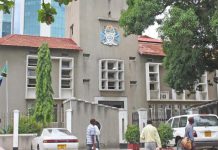AfricaPress-Tanzania: THE High Court of Tanzania has ordered a South Korean firm, KTMI Company Limited, which is renovating MV Victoria and MV Butiama at 27.6bn/-, to deposit in court 215,000 US dollars (about 500m/-), as security in a pending lawsuit.
Judge Mustafa Ismail ruled in favour of a local company, Yuko’s Enterprises (EA), Limited, after considering an application for, among others, order compelling the South Korean Company to show cause as to why it should not furnish security for appearance in Court in the suit involving the parties.
Such suit is in relation to a dispute into two joint venture agreements that bid a tender for rehabilitation of two vessels known as MV Victoria and MV Butiama at a contractual value of 22, 712,098,200/-exclusive of Value Added Tax (VAT) and 4,897,640,000/-, respectively.
“The sum ordered to be deposited into the Court’s account will be the equivalent of 215,000 US dollars, which is the balance of uncontested sum of 500,000 US dollars that was to be paid to the applicant and in respect of which the respondent has expressed willingness to pay, but no yet settled,” he ordered.
In the suit, the local company is demanding 857,606 US dollars, which is equivalent to 1,956,199,286/-, constituting loss of income and profit on claims that the South Korean firm reneged the terms of the agreement by sub-letting, to third parties, some assignments meant for the applicant in the project.
However, KTMI Company Limited had denied the allegation, claiming that only one sub-contractor had been engaged and this is an international manufacturer of engines for inland waterway ships.
During hearing of the application, Yuko’s Enterprises (EA) Limited, the applicant, stated that upon filing the suit he learnt that the project has been completed for over 95 percent and upon completion in fullest, KTMI Company, the respondent will be handed over to the employer, the government of Tanzania.
The applicant noted that it was the only project that the Respondent is executing in Tanzania and has no any immovable property, thus, there is probability for the latter would leave the country soon after completion of the project.
In the circumstances, the applicant submitted that it would be just and equitable for the Court to grant the application, otherwise there was a danger he would suffer irreparably as there would be obstruction or delayed in the execution of any decree that may be passed against the respondent.
Delivering the ruling, Judge Ismail noted that the respondent is a foreign company whose singular undertaking and basis for its presence in the country is execution of the contract for construction of the two ships.
This means that, he said, the respondent’s presence in the country is activity based and dependent upon the subsistence of the contract undertaken.
He was of the views that the imminence due and looming in leaving the country for the respondent was real and not imaginary.
The respondent had contended, among others, that there is still a defects liability period after completion of the project due for May 2020.
In his ruling, however, the judge found the respondent’s contention flawed.
According to him, the defects liability period is simply a period of time following practical completion during which a contractor remains liable under the building contract for dealing with any defects which becomes apparent.
“Thus, while the respondent will be liable to remedy any defects that may become apparent post implementation of the contract, it is not correct, as rightly contended by the applicant, to argue that such period constitutes part of the contractual period,” he said.
The judge noted further that the respondent would only be liable if there are defects to remedy and that would not require her hanging around for all that period, but she may, as well, sublet activities falling under the defects liability period to whomsoever it may choose, and remedy the defects.
However, the judge came with a different approach whether the departure of the respondent is intended to obstruct or delay the applicant’s efforts to execute the decree should the court grant the prayers in the pending suit.
“Nothing has been laid to the fore to convince this Court that, other than the respondent’s inevitable and expected removal from the Court’s jurisdiction, arising out of completion of the contracted duties, a connection exists between such removal and the pending court proceedings,” he said.
As such, the judge said, nothing has been adduced by the applicant to create any semblance of cogency that the respondent desires that execution of the decree which may be passed be stifled or delayed.
It is merely the applicant’s own apprehension and speculation which lacks credence worth believing in.







